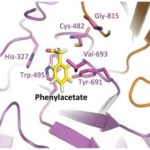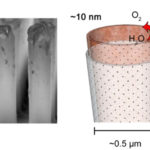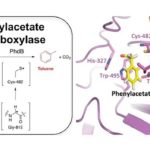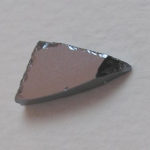“The key design principle of natural photosynthesis is the closing of the photosynthetic cycle on the shortest possible length scale under membrane separation of the incompatible water oxidation and proton reduction environments,” said Heinz Frei, a senior scientist in Biosciences’ Molecular Biophysics and Integrated Bioimaging (MBIB) Division. With collaborators Eran Edri, a former postdoctoral fellow in MBIB now at Ben-Gurion University, and Shaul Aloni in the Molecular Foundry Division, Frei developed a fabrication method to make a square-inch sized artificial photosystem, in the form of an inorganic core-shell nanotube array, that implements this design principle for the first time. The method was described in a paper published earlier this year in ACS Nano.
Women Scientists & Engineers Council Marks 10th Anniversary
 Marking its 10th anniversary this year, the Women Scientists & Engineers Council (WSEC) is about to embark on a new set of initiatives to make the Lab an even better place to work, from partnering with HR on the development of new training opportunities, to exploring ways to improve communication around maternity leave for new hires.
Marking its 10th anniversary this year, the Women Scientists & Engineers Council (WSEC) is about to embark on a new set of initiatives to make the Lab an even better place to work, from partnering with HR on the development of new training opportunities, to exploring ways to improve communication around maternity leave for new hires.
Several Biosciences staff members are active in WSEC namely MBIB’s Jill Fuss, Work-Life Balance subcommittee, JGI’s Esther Singer, Empowerment subcommittee co-chair Esther Singer and Biosciences’ Astrid Terry, Networking subcommittee co-chair.
Read more in Today At Berkeley Lab.
JBEI Enzyme Discovery Enables First-Time Microbial Production of the Octane Booster Toluene
 Researchers at the Department of Energy’s Joint BioEnergy Institute (JBEI) and Lawrence Berkeley National Laboratory (Berkeley Lab) have discovered a new enzyme that will enable microbial production of a renewable alternative to petroleum-based toluene, a widely used octane booster in gasoline that has a global market of twenty nine million tons per year.
Researchers at the Department of Energy’s Joint BioEnergy Institute (JBEI) and Lawrence Berkeley National Laboratory (Berkeley Lab) have discovered a new enzyme that will enable microbial production of a renewable alternative to petroleum-based toluene, a widely used octane booster in gasoline that has a global market of twenty nine million tons per year.
Beyond the WIMP: Unique Crystals Could Expand the Search for Dark Matter
A new particle detector design proposed by Berkeley Lab researchers, including Stephen Derenzo, Stephen Hanrahan, and Gregory Bizarri of theMolecular Biophysics and Integrated Bioimaging Division (MBIB) could greatly broaden the search for dark matter into an unexplored realm. Dark matter makes up 85 percent of the total mass of the universe, yet we don’t know its composition.
Doudna Featured on CBS ‘Sunday Morning’ Program
Reporter Mo Rocca explores “strokes of genius” in this episode. Among those he interviews is Jennifer Doudna, faculty scientist in the Molecular Biophysics and Integrated Bioimaging Division. The co-discoverer of the CRISPR gene-editing technology does not consider herself a genius, but rather thinks teams are more productive than individuals. Rocca also interviews internet pioneer Vint Cerf and musician Wynton Marsalis. Watch the episode.
- « Previous Page
- 1
- …
- 44
- 45
- 46
- 47
- 48
- …
- 78
- Next Page »
Was this page useful?








